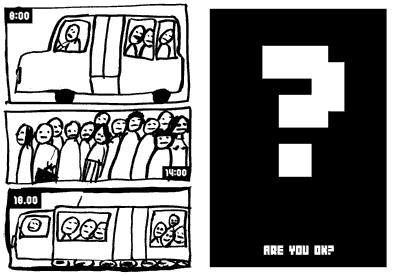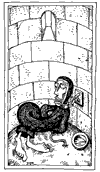
Michael Nicoll Yahgulanaas, CAN
|
I was born and have spent
my whole life in the small Vojvodina town of Vrsac, only 200 meters from
the Dr. Slavoljub Bakalovic Neuropsychiatric Hospital - the largest institution
of its kind in our country. It was simply impossible to grow up and live
in this town without noticing all the weird characters hanging around the
park, the square, the bus station, and the centre of town. We were spooked
and alarmed by their presence, but our parents reassured us: these were patients
from our local crazy house, but we need not fret, for the crazies wandering
about the town were harmless and good natured, which is why the psychiatrists
gave them leave. The really dangerous and aggressive ones were kept safely
locked up in the closed wards of the local crazy house.
Years later, talking with the comic artists, musicians, writers and performers
involved in our local underground art scene, I realised the tremendous effect
our local loonies had had on our work in terms of bizarrenes and oddity.
I guess, in a way, we accepted the existence and presence of lunacy as a
fact of life, as something you just have to live with. All the same, when
Stripburger contacted me to write the foreword to Madburger, I didn't feel
quite comfortable with the idea. I wondered how come Katerina and Igor thought
me to be the most competent to write the foreword. Do I really look look
like such a crackpot?? Feeling apprehensive about the heavy burden of responsibility
I had assumed, I decided to seek expert counselling and who better qualified
than my wife Nataša, who has spent 14 years as a nurse in the already mentioned
Dr. Slavoljub Bakalovic Neuropsychiatric Hospital.
My first question to my esteemed expert counsellor was: "How true is the
myth that lunacy is an indispensable prerequisite for any sort of real creativity?
Does an underground comic artist really have to be a bit crazy to be genuinely
creative?" And nurse Nataša replied: "I think a lot of artists flirt with
the idea of madness, not realising that madness is a great tragedy for the
person actually living it! Everyone who thinks being crazy is really cool
should come to one of the closed psychiatric wards where I work to see our
patients - people who have basically lost everything worth anything and are
left with a life filled only with great pain and fear, which they cannot
rid their minds of. You can't speak of any enlightened creativity here. I
think their psychological distress, things that cause them great suffering
and tear them up inside, are often misinterpreted as some sort of creativity
by people from the so-called normal world." To which my next question was:
"So what do you think then of these normal people you've just mentioned?"
And Natasa replied: "I think the worst of them! They are cynical profiteers
exploiting someone else's misfortune - they make out their crazy artists
to be some sort of supernaturally talented beings and heroes, only to profit
from their genuine mental agony."
Together we carefully examined all the works included in the Madburger and
concluded that this anthology is so bizarre, outlandish and just plain odd,
it far surpasses all previous Stripburger anthologies. We believe it should
be read only after careful preparation and with great concentration, for
getting too involved in its content could lead to extraordinary phenomena
including wild leaps of imagination, strange visions or even outright hallucinations,
the diminishing and disintegration of the personality and other acute psychotic
phenomena. Ha-ha, I hope that didn't put you off! Some of the works you can
see here are so convincing and vivid, one gets seriously worried about the
future of their authors.
But seriously, my favourite definition of mental illness or madness (to be
less politically correct) is the one that claims a mad person is not sick,
he is just someone who is so overwhelmed by the contents of his subconscious
he cannot control it. Another definition I find worth seriously considering
is the anti-psychiatric definition whereby a mad person is really the product
of a dysfunctional family and society, and the so-called normal individual
is not really healthy, rather he is a pathetic machine automatically conforming
to and fulfilling the norms of the ruling social order. By this definition
a mad person is of course not healthy, but neither is a 'normal' one.
For me working in underground comics means being able to question and confront
any norms and so-called truths freely and directly without submitting myself
to any authority. In my view this anthology, by encompassing such a wide
range of different ideas, visual and narrative styles, represents exactly
that, taking the necessary step in the direction of examining the fundamental
question of what is madness and what is normality.

Lucie Markvartova, CZ
|

Marcel Ruijters, NL
|